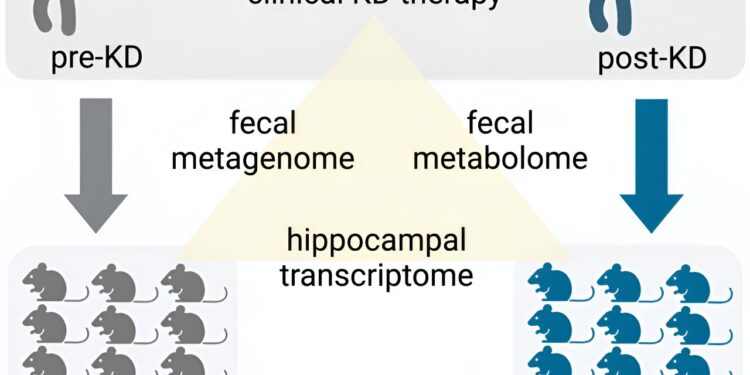Credit: Cell Reports (2023). DOI: 10.1016/j.celrep.2023.113521
The high-fat, low-carb ketogenic diet is more than just a trendy weight loss tactic. It is also known to help control seizures in children with epilepsy, especially those who do not respond to first-line anti-epileptic medications.
In a new UCLA study published in the journal Cell Reportsresearchers demonstrate that diet-induced changes in the human gut microbiome (the billions of bacteria and other microorganisms that live in the digestive tract) can confer protection against seizures in mice.
Understanding how microbiome function is altered by diet could help develop new therapeutic approaches that incorporate these beneficial changes while avoiding some of the downsides of diet, said the study’s lead author, Gregory Lum, a postdoctoral researcher. in the laboratory of Elaine Hsiao, professor at UCLA.
The ketogenic diet is not recommended as a primary anti-seizure option because patients are often averse to drastic changes in their food intake or have difficulty following the diet due to its strict requirements and potential side effects such as nausea, constipation and fatigue.
Hoping to find new ways to more effectively treat seizures in about a third of people with refractory epilepsy who do not respond to existing anti-epileptic drugs, Lum sought to understand the molecular mechanisms underlying the alteration of the human intestine by food. microbiota.
Previous research by Hsiao’s lab found that in a mouse model bred to mimic epilepsy, mice fed a ketogenic diet had significantly fewer seizures than mice fed a standard diet. Lum took this research further by studying how the gut microbiome is beneficially altered in children with epilepsy who begin a ketogenic diet. To this end, he transplanted fecal samples from pediatric epileptic patients placed on a diet into mice to determine whether the gut microbiota associated with the diet would protect the mice against seizures.
Fecal samples were collected in collaboration with the UCLA Ketogenic Diet Therapy Program from 10 pediatric epilepsy patients who did not respond to anti-epileptic medications and were subsequently treated with the ketogenic diet. The samples were taken before the start of the diet and after one month of the diet.
The study found that mice given fecal transplants from patients collected after a month on the diet were more resistant to seizures than mice given fecal transplants on a pre-ketogenic diet.
Importantly, the study also found that in pediatric patients, the ketogenic diet altered key functions of the gut microbiome related to fatty acid oxidation and amino acid metabolism – and that these changes were preserved when feces were transplanted into mice.
Although more research into these changes is needed, Lum said, the study shows promise as a step toward discovering new microbiome-based therapies for pediatric epilepsy patients who don’t respond to standard anti-epileptic medications .
“Reducing the functions of beneficial microbes for seizure protection can potentially lead to new ways to improve the effectiveness of the ketogenic diet or mimic its beneficial effects,” he said.
More information:
Gregory R. Lum et al, Ketogenic dietary therapy for pediatric epilepsy is associated with alterations in the human gut microbiome that confer seizure resistance in mice, Cell Reports (2023). DOI: 10.1016/j.celrep.2023.113521
Provided by University of California, Los Angeles
Quote: The keto diet protects against epileptic seizures, and scientists find out why (December 18, 2023) retrieved December 18, 2023 from
This document is subject to copyright. Apart from fair use for private study or research purposes, no part may be reproduced without written permission. The content is provided for information only.



